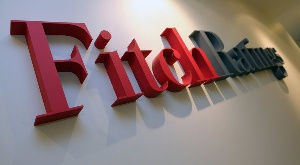An IMF programme that supports fiscal consolidation and addresses macroeconomic imbalances in Ghana could stabilize the outlook on the country’s ‘B’/Negative sovereign rating, Fitch Ratings says.
However, an IMF programme is not a foregone conclusion, nor is its effective implementation. A lasting reduction in exchange rate and funding pressures is unlikely until a programme is agreed and a credible deficit reduction strategy is implemented.
The Ghanaian government over the weekend said it would approach the IMF for talks on a possible programme, after months of announcements and policy initiatives that appeared to make talks unlikely in the short term.
The government will probably seek endorsement for the country’s ‘home grown’ strategy, but given its recent track record, may find the IMF’s likely suggestion of faster, front-loaded fiscal consolidation challenging.
Ghana’s strategy focuses on raising government revenue, improving public financial management and alleviating the energy crisis. Proposed fiscal consolidation remains modest.
We forecast a fiscal deficit of 10.1% of GDP in 2014, against the government’s forecast of 8.8% (recently increased from 8.5% in the supplementary budget) moderating to 6% of GDP in 2016.
Ghana has also been planning a Eurobond issue for as much as USD1.5bn. A successful issue may strengthen the government’s hand and lengthen the negotiations.
Macroeconomic challenges have continued to intensify this year. Government funding costs have risen steeply. 182-day treasury bill yields have jumped above 25%, from 19%.
Interest costs now account for one-fifth of government expenditure. High yields have seen auctions of five- and seven-year bonds cancelled.
A shortage of local currency liquidity has resulted in banks and non-bank financial institutions cutting holdings of government securities – one reason the central bank funded USD1bn (or 85%) of the budget deficit during the first five months of 2014.
This has complicated liquidity management and added to inflationary pressures and cedi weakness.
The cedi has plummeted 30% since the beginning of the year. Challenges in the FX market have intensified with a gap opening between the rate at which the Central Bank supplies dollars to the market (GHC/USD3.03), and the interbank rate (GHC/USD3.43). This gap has widened to GHC40c since May, from GHC10c.
Parallel exchange markets are creating distortions in the domestic economy and exacerbating the shortage of dollars.
Gross international reserves have continued to fall, to USD4.5bn or 2.2 months of current external payments (CXP) in June from USD5.6bn at end-2013. Stripping out swap facilities, reserves cover only 1.5 months of CXP.
A Eurobond issue and the upcoming USD2bn syndicated loan to the Ghana Cocoa Board to finance the purchase of this year’s cocoa crop may alleviate short term pressure on foreign exchange reserves.
However, pent-up dollar demand and a double-digit current account deficit could see these dwindle again over the coming months.
Fitch placed Ghana’s ‘B’ IDR on Negative Outlook in March, highlighting deteriorating external and fiscal balances and the increasing challenge and cost of financing the deficit.
A further deterioration in external finances and an erosion of international reserves that jeopardised external financing capacity are negative ratings sensitivities. The next scheduled rating review is on 26 September.
General News of Tuesday, 5 August 2014
Source: Fitch













